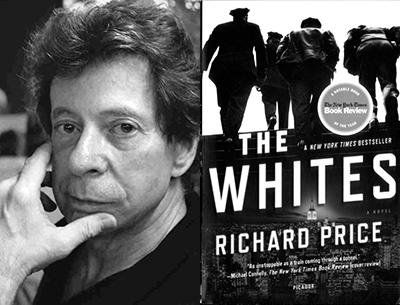Gods and Monsters

“The Whites”
Richard Price
Picador, $16
You’d think by now the paperback release would’ve gone the way of the rooftop aerial antenna.
It can’t all be about convenience for air travel, can it? Consumer-friendliness, maybe? But by the time the cheaper paperback comes out, the Gorilla Grodd of retail, Amazon, has already had its way with the price point. To say nothing of the e-book.
There’s novelty, of course, a paperback’s designer often improving on the earlier cover, from look to legibility. In the case of Richard Price’s “The Whites,” a badge proclaiming it a New York Times “Notable Book of the Year” has materialized in the midst of the vintage ass-eye view of four of New York’s finest ascending concrete steps skyward.
More to the point, gone is the puzzling “Writing as Harry Brandt” addition to the byline. Enough ink was spilled about that back with the hardcover release, but in the end, if Mr. Price turns out roughly two novels a decade, there’s not only no need to mask any Stephen King-style ubiquity, there’s also no need for anonymity’s granting of license to explore genre fiction. Fiction is freedom.
And anyway, this is more than a crime novel of cops and perps, it’s a bare-knuckled story of urban America, with elemental forces at play — evil and compassion, crime and punishment, justice and vengeance, loyalty and betrayal, filial love and debilitating grief.
Billy Graves, of the “crushed-cellophane gaze,” 16-ounce energy drinks, and Camel Lights, may be a detective relegated to the N.Y.P.D.’s Night Watch (“Man was not meant to start work after midnight — pay differential be damned”), a career trajectory begun when his errant bullet killed a kid, but in the late 1990s he ran with the Wild Geese, a group of seven young cops assigned to the worst section of the East Bronx. Hold the post-footchase beatdowns, these guys enjoyed themselves, treating their collars “like members of a defeated softball team.” Protectors, avengers, they “walked the streets like gods.”
They also, each of them, developed obsessions with cases gone wrong, with perpetrators of atrocities who escaped justice. These were their Whites, the term coming from Ahab’s mad pursuit in “Moby-Dick.”
As one character, not in the Geese, puts it, forget Christian forgiveness, “these last few years? I’m all about the God of the Jews.”
When that kind of biblical vengeance comes a-knocking at Billy’s Yonkers door, and in the person of beefy Milton Ramos, one of his Night Watch squad’s own detectives, no less, you see how the plot thickens.
Without giving too much away, one problem, and a big if plot-driving one in a story of such gritty, even relentless, verisimilitude, involves this hounding Fury. His motivation isn’t commensurate with his actions. Milton has suffered crushing loss, going back two decades to the mistaken-identity killing of one of his brothers and later the hit-and-run death of his wife, leading him to adopt a strategy of “long-term, indirect payback.” But that not only jeopardizes his relationship with his grade-school daughter (“he loved deep if not demonstrably”), it compels him to take a baseball bat to an innocent man until we see “an ivory shard of bone that had broken through the sleeve of his shirt winking in the moonlight.”
The plot, at any rate, allows Mr. Price to do what he seems most interested in doing, burrowing into the details of modern and not-so-modern urban life, from the Cymbalta and Abilify popping of middle-aged marrieds to offhand dialogue that can read as if the author had intimate knowledge of Depression-era truckstops: “The meat’s so tough that it got up off the plate and beat the shit out of the coffee, which was too weak to defend itself.”
Such snippets and passing descriptions are the highlight, and if you’re a fan of hard times and low life, can make your heart swell: a “gappy mosaic tile floor like a piss-bum’s smile”; a cemetery is “a crowded mouthful of gray teeth, unkempt and askew.”
And then there’s Jimmy Whelan, after 20 years on the force now a building’s super living in a converted basement utility room “utterly devoid of dignity” and with a clothesline running through it, “the most unconflicted, reasonably happy individual Billy had ever known.”
They talk. Billy may call in a chit for the protection of his family. “ ‘Be like old times,’ Jimmy said, opening the window and flicking his cigarette upward onto the sidewalk.”
Reaching for the gutter? If anyone can explain the pleasure in such a simple line, I’m all ears.
Richard Price lives in Harlem and Amagansett.
